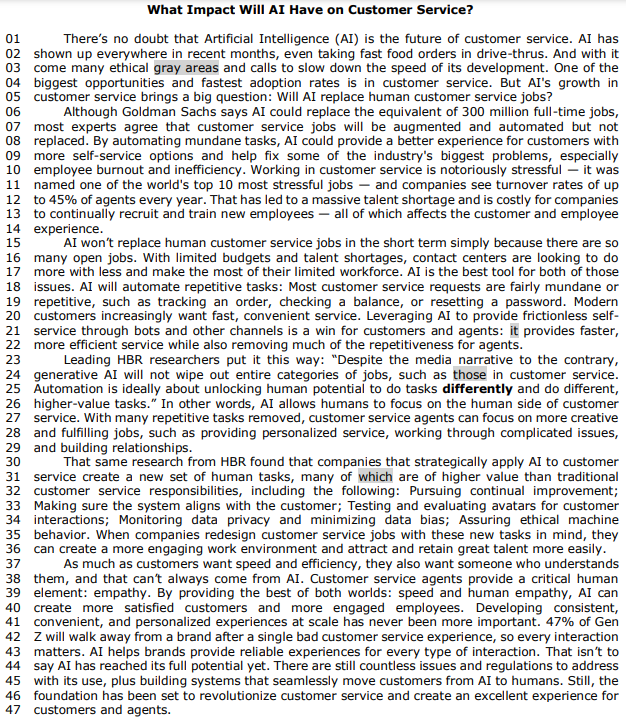Questões de Concurso
Comentadas sobre substantivos e compostos | nouns and compounds em inglês
Foram encontradas 254 questões
Julgue o item subsequente.
Pronouns, including personal pronouns like “he” and “she,”
replace nouns to avoid repetition. Understanding the
nuances of different pronoun types—personal,
demonstrative, relative—is essential for constructing clear
and concise sentences, contributing to effective
communication in English.
Julgue o item subsequente.
Grammatical number distinguishes between singular and
plural forms of nouns, affecting both their morphology
and associated verbs. A nuanced understanding of
number agreement is essential for constructing
grammatically correct sentences, ensuring coherence and
precision in English communication.
Julgue o item subsequente.
Subordinate clauses, also known as dependent clauses,
are introduced by subordinating conjunctions such as
“although,” “because,” or “while.” These clauses provide
additional information and cannot stand alone as
complete sentences. Proficiency in using subordinate
clauses enhances sentence complexity, enabling the
conveyance of intricate relationships and details in
American English.
Julgue o item subsequente.
Nouns, as essential components of language, categorize
and name entities, encompassing both tangible and
abstract concepts. The proper understanding of noun
classifications—common, proper, concrete,
abstract—facilitates precise and effective communication,
as nouns serve as the foundation for constructing
meaningful sentences.
Julgue o item subsequente.
Collective nouns, like “team” or “family,” present a
challenge in determining whether to treat them as
singular or plural. The context and intended emphasis
guide the decision, reflecting the collective unit's unity or
the individuality of its members. Mastery of collective
noun usage refines language precision and clarity.
Julgue o item subsequente.
Definite articles, “the,” specify a particular noun that is
already known or has been previously mentioned in the
context. Understanding the appropriate use of definite
articles is crucial for indicating specificity and reference in
American English.
Julgue o item subsequente.
Irregular plural forms, such as “children” and “geese,”
deviate from standard rules for creating plurals in English.
Recognizing these irregularities is crucial for accurate
usage, as these unique forms contribute to the richness
and diversity of the language. Mastery of irregular plurals
enhances language proficiency and writing skills.
Julgue o item subsequente.
Countable and uncountable nouns present distinct
challenges in English grammar. Countable nouns refer to
individual items that can be enumerated, while
uncountable nouns denote substances or concepts
without clear boundaries. Mastery of these distinctions is
crucial for accurate article usage and grammatical
agreement.
Julgue o item subsequente.
The zero article, the absence of any article, is used in
specific contexts, such as with plural and uncountable
nouns or when referring to things in general.
Understanding when to omit articles is essential for
precise communication in American English.

(1) Countable. (2) Uncountable.
( ) The children are playing at the park. ( ) Hot water is always good for sore muscles. ( ) Our research is going to be groundbreaking, I bet. ( ) My heart is set on this, I can’t change it.
(1) Noun. (2) Present participle. (3) Adjective.
(_) Playing piano is a great pleasure.
(_) That man is drinking.
(_) No parking.
( ) The rising prices are scary.
Try these expert tips for a safer solo trip

(Available at: https://news.airbnb.com/try-these-expert-tips-for-a-safer-solo-trip/ – text especially adapted for
this text).
I. It expresses a small amount. II. Its use is correct because it precedes an uncountable noun. III. It would be grammatically correct to replace the word by “many”.
Which ones are correct?